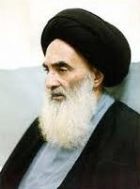Ayatollah Ali Sistani deserves Nobel Peace Prize according to UK Sunday Telegraph Chief Foreign Correspondent
 Baghdad (IraqiNews.com) Colin Freeman is the Chief Foreign Correspondent for the Sunday Telegraph has written an essay entitled “Forget Obama and the EU. The man who should really have the Nobel Peace Prize is an obscure Iraqi cleric.”
Baghdad (IraqiNews.com) Colin Freeman is the Chief Foreign Correspondent for the Sunday Telegraph has written an essay entitled “Forget Obama and the EU. The man who should really have the Nobel Peace Prize is an obscure Iraqi cleric.”
Freeman said ” I’m not talking about a posthumous award for Nelson Mandela (he won it in 1993). Instead, the man I have in mind is Grand Ayatollah Ali Sistani, the highest ranking Shia Muslim cleric in Iraq, who has done arguably more than anyone to turn the country away from all-out civil war.”
He added ” Grand Ayatollah who? No, you may never have heard of him. Unlike some Iraqi religious leaders, he doesn’t make a habit of going on television and waving a Kalashnikov around. Nor has he ever been pictured with Bush or Blair. Indeed, to my knowledge, he has never consented to meet a single Western politician.
Instead, the 83-year-old mullah just gets quietly got on with his job, living in a modest house down a side street in the holy city of Najaf, and issuing various edicts for his followers, who make up the vast majority of moderate Iraqi Shias.
True, some of these edicts are not very progressive as far as the average Scandinavian Nobel prize judge is concerned. Like most Shia clerics, Sistani doesn’t approve of dancing or drinking. And in 2006, he issued a fatwah calling for homosexuals to be killed “in the most severe way” (it was later retracted, with some claiming it was issued erroneously by an aide).
But by Iraqi standards, he’s been an outstanding voice of moderation, peace and tolerance, without whom the country would probably be a far bloodier place than it already is.
To get an idea of this, you have to go back to just after the US invasion, when the ex-Baathists of Iraq’s Sunni minority formed their unholy alliance with the Sunni zealots of Al-Qaeda. While killing Americans was one of their priorities, their other real passion was killing Shias, whom they viewed not just as US collaborators but as apostates too.
In the decade since, the Shia community has suffered the most appalling provocation. Most of the car bombs that have gone off in Baghdad over the years have been targeted at Shia neighbourhoods, killing thousands. Sunni death squads regularly ambush Shia pilgrims as they head to Sistani’s city of Najaf, turning the annual holy festivals into a ritual slaughter. In 2006, al-Qaeda also bombed the Shia holy shrine at Samarra, an act roughly the equivalent to destroying St Peter’s Basilica.
Yet throughout all this bloodshed, Sistani has beseeched ordinary Shias not to retaliate. No, he has not been entirely successful. In the year that followed shrine attack, a low-level Sunni-Shia civil war broke out, with tens of thousands dying in tit-for-tat violence.
But as with so many things in Iraq, the horrors that actually took place were nothing compared to how bad it could have been. In telling his fellow Iraqis to turn the other cheek, sometimes when it was quite literally stained with their loved one’s blood, Sistani has helped averted all-out disaster, and is credited as such by many Western diplomats. He continues in this role today, as a resurgent al-Qaeda continues to re-ignite the civil war.
What makes Sistani all the more statesmanlike, though, is that he preaches peace while getting precious little thanks for it from those around him. Fellow Shias accuse him of being too timid in the face of Sunni aggression. Al-Qaeda hate him for unsportingly refusing to join in their sectarian civil war. But these are not the only matters on which he has gone against the grain. During the American occupation, he refused to ever sanction attacks on US troops, despite the street cred this would have won him in some Iraqi circles. And to the irritation of his fellow Shia mullahs in neighbouring Iran, he remains resolutely of the “quietist” school of Islam, which says religion has no place in government.
Yet unlike Mandela or the Dalai Lama, this reclusive, media-unfriendly cleric has no armies of bein-pensant wellwishers in the West. Indeed, the man who has arguably done more than anyone else for Middle Eastern peace has virtually no recognition among the keffiyah-wearing classes.
True, a group of Iraqi Christians nominated him for the Nobel Peace Prize in 2006, for giving “Muslims all around the globe a good example how to follow peaceful ways”. But to my knowledge, he’s never made the shortlist, and today, rather than going on global lecture tours, he’s still holed up in that alleyway in Najaf, trying to bring peace to Iraq.
In other words, perhaps he’s just a bit too “quietist” to be a modern Nobel Peace Prize winner.”
